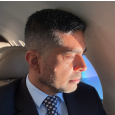KAYAK is a metasearch engine for travel services including airline flights, rental cars, and vacation packages. It was founded in 2004 and is now owned and operated by Booking Holdings.
You have had something of an unconventional upbringing. Looking back, how did your background influence your decision to launch a travel meta-engine search company?
I traveled quite a bit when I was younger, though it wasn't always voluntary. My mom is Swedish, my dad is American, they met in Spain, and I was born in Peru. During my childhood, we moved through Peru, Costa Rica, Guatemala, and Sweden. This experience taught me to travel light and to make friends quickly.
It also gave me an appreciation for different perspectives around the world and instilled in me a love of travel and a broad worldview, which I have carried into my business career. I first launched Orbitz, an online travel agency, and then founded KAYAK 20 years ago to help people book travel across airlines, hotels, rental cars, and more. It's been a great ride.
This year marks Kayak’s 20th anniversary - congratulations! In your opinion, how has the travel industry changed both for the better and the worse?
You can't digitize the actual travel experience—you still have to board a plane, stay in a hotel, rent a car—but everything else has gone digital, which has improved the process. It's easier to figure out where to go, see destinations online, transact, and make changes. You don't even need to talk to a human for customer service anymore.
The convenience is unmatched; our devices now store and share our travel experiences effortlessly. It’s great to be able to constantly visit new destinations, which enriches personal growth. Despite the digital transformation, the essence of traveling to different places remains invaluable.
What is the main driver behind the significant increase in travel demand the industry is experiencing post-pandemic?
As the world gets wealthier, people spend more on travel and experiences. Travel as a function of GDP has been increasing steadily over the last 30 years and has accelerated post-pandemic due to pent-up demand. This phenomenon, often called "revenge travel," spiked after the restrictions were lifted but is now settling down. Despite the temporary spike, travel-related GDP continues to grow at about 6-7% per year, outpacing the 3% growth of world GDP. This indicates a long-term trend towards more travel spending, similar to healthcare's consistent growth.
In terms of preferential travel destinations, what are some notable observations of places experiencing increased demand interest?
Hong Kong is currently really popular, along with Korea and Japan. Mainland China, however, isn’t seeing much American tourism. On the other hand, there's a significant surge of outbound Chinese travelers to the U.S. and Europe.
You have previously stated that travel companies often struggle to integrate their platforms. Why is this the case, and how is Kayak working to make the booking experience more integrated?
We've been trying to solve the problem of showing consumers everything in one place for 20 years. Travel information is partially digitized, and some supplier sites are slow, frustrating users who expect quick results. Moreover, loyalty programs and miles complicate the integration since not all sites have all inventory, leading people to cross-shop. Travel is a significant purchase, so people naturally look for the best deals across multiple sites. While we aim to be the go-to platform for this search, the complexity and scale of the task present ongoing challenges.
We have direct connections with almost 200 airlines. While most people prefer booking directly with airlines for miles and customer service, these suppliers often don't show the best prices across all airlines. Therefore, shopping on Kayak helps users compare prices and find the best deals before booking directly or through another platform.
Which technological advancements are you leveraging to modernize your platforms and improve the overall customer experience?
AI is a significant tool for us, and we've been using it for years. It helps personalize the user experience by narrowing down the thousands of results to the most relevant ones for each user. We're working on making the filters pre-text or voice-based to simplify the search process further.
Additionally, we are developing a skunk lab that will allow bookings directly on KAYAK via text or voice, potentially even using a video avatar in the future. AI's biggest impact will likely be in customer service, where it can enhance efficiency and response times significantly.
Can you tell us about your new platform ‘Kayak for Business’, and the difference in maturation between leisure and business?
‘KAYAK for Business’ is growing, with three major enterprise customers like PriceWaterhouseCoopers and Diageo, and 30,000 smaller companies using it. The product includes corporate fares and virtual credit cards, eliminating the need for expense reports. Despite being only three years in, it has significant growth potential.
Our leisure side is much more mature, being 20 years old, while the business side launched only in 2021. Building demand on the consumer side is easier as it involves convincing individuals, whereas corporate travel requires convincing corporate travel managers and customizing the platform to their needs.





